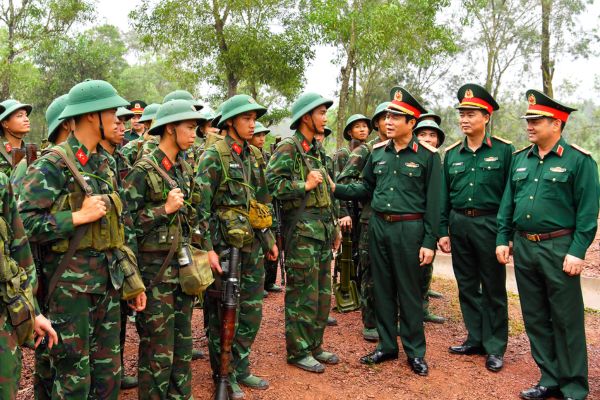10 principles of disciplinary actions in the Military according to Circular 143/2023/TT-BQP: What do they include? How many forms of disciplinary actions are there for officers who violate military discipline?
What are the 10 principles of disciplinary handling in the Military according to Circular 143/2023/TT-BQP?
Based on the provisions of Article 4 Circular 143/2023/TT-BQP, the principles of disciplinary handling in the Military include:
- All disciplinary violations, when detected, must be promptly prevented and strictly handled; the consequences caused by disciplinary violations must be remedied according to the provisions of law.
- Each disciplinary violation is handled only once by one form of discipline; at the same time of considering the disciplinary handling, if the violator has committed 02 or more violations, each act must be examined and concluded, and a common decision is made with the highest form corresponding to the violation.
In case of multiple disciplinary forms, it is decided by the competent authority.
- The handling of discipline must ensure objectivity, fairness, severity, accuracy, and promptness; correct authority, order, procedures; compliance with the law; synchronization between Military discipline and Communist Party discipline; Military discipline is not lower than Communist Party discipline; Military discipline does not replace Communist Party discipline, mass organization discipline, and vice versa.
- Disciplinary violations must be based on content, motive, nature, level, consequence, cause of violation, specific circumstances, mitigating circumstances, aggravating circumstances, attitude towards correction, remediation of shortcomings, and the consequences caused by the violations.
- It is strictly forbidden to infringe upon the physical body, honor, dignity, and reputation of the violator during the disciplinary handling process; not applying other forms of discipline instead of those stipulated in this Circular.
- No collective disciplinary action against agencies or units violating the guidelines and policies of the Communist Party, laws of the State, or having multiple violators; only considering disciplinary action for the responsibility of commanders, political commissars, political officers, and each individual violator.
- Not applying the rank demotion form of discipline for officers and professional soldiers holding the rank of second lieutenant, soldiers holding the rank of private;
Not applying the demotion or dismissal form of discipline towards violators not holding a command or managerial position;
Not applying the salary reduction form of discipline for officers not yet promoted; personnel working in cryptographic organizations; officials, workers, and public employees in defense enjoying salary Level 1.
- When handling discipline, in addition to the disciplinary form for each violation, if the violation causes material damage, the violator must also compensate. Assets, money, materials obtained from the violation must be handled according to the provisions of law.
- Commanders at all levels must be responsible for the situation of disciplinary and legal violations of the soldiers under their jurisdiction; depending on the nature, level of violation, consequences caused by the case, and the degree of responsibility of the direct and one-level higher commander to determine the form of discipline.
- Not transferring the job of the person detected with a violation who has not yet been handled according to regulations. If the disciplinary violation shows signs of a crime, the agency or unit shall not reduce the management force but transfer the violation dossier to the Military investigative agency for handling according to law;
In case of being tried by a court and sentenced to non-custodial reform or imprisonment but allowed to serve the sentence suspended, only resolve policies after the court's judgment or decision takes legal effect and has handled the corresponding form of discipline.

10 principles of disciplinary handling in the Military (Image from the internet)
How many forms of discipline are there for Military officers violating discipline?
Based on the provisions of Clause 1, Article 11 of Circular 143/2023/TT-BQP regarding the forms of discipline for Military officers as follows:
Forms of Discipline
1. Forms of discipline for officers
a) Reprimand;
b) Warning;
c) Salary reduction;
d) Demotion;
e) Dismissal;
f) Rank demotion;
g) Stripping of officer rank;
h) Stripping of military title.
Thus, for Military officers violating discipline, there are a total of 08 forms of discipline as mentioned above. According to the severity of the discipline, the highest form is "Stripping of military title."
Can a person violating discipline in the Military appeal the disciplinary decision?
Based on the provisions of Article 8 Circular 143/2023/TT-BQP as follows:
Appealing the disciplinary decision
1. In case the violator does not agree with the disciplinary handling decision, they have the right to appeal to the competent agency or unit according to the regulations of law and the Ministry of National Defense.
Until there is a resolution decision from the competent level, the violator must still strictly comply with the current decision.
2. Agencies and units receiving the appeal from the violator must be responsible for considering and responding in accordance with their authority and within the time frame stipulated by law and the Ministry of National Defense.
Thus, according to the above-mentioned regulations, in case the violator does not agree with the disciplinary handling decision, they have the right to appeal.
Accordingly, the appeal will be made to the competent agency or unit according to the regulations of law and the Ministry of National Defense.
Agencies and units receiving the appeal from the violator must be responsible for considering and responding in accordance with their authority and within the time frame stipulated by law and the Ministry of National Defense.
Circular 143/2023/TT-BQP will take effect from February 15, 2024.
LawNet